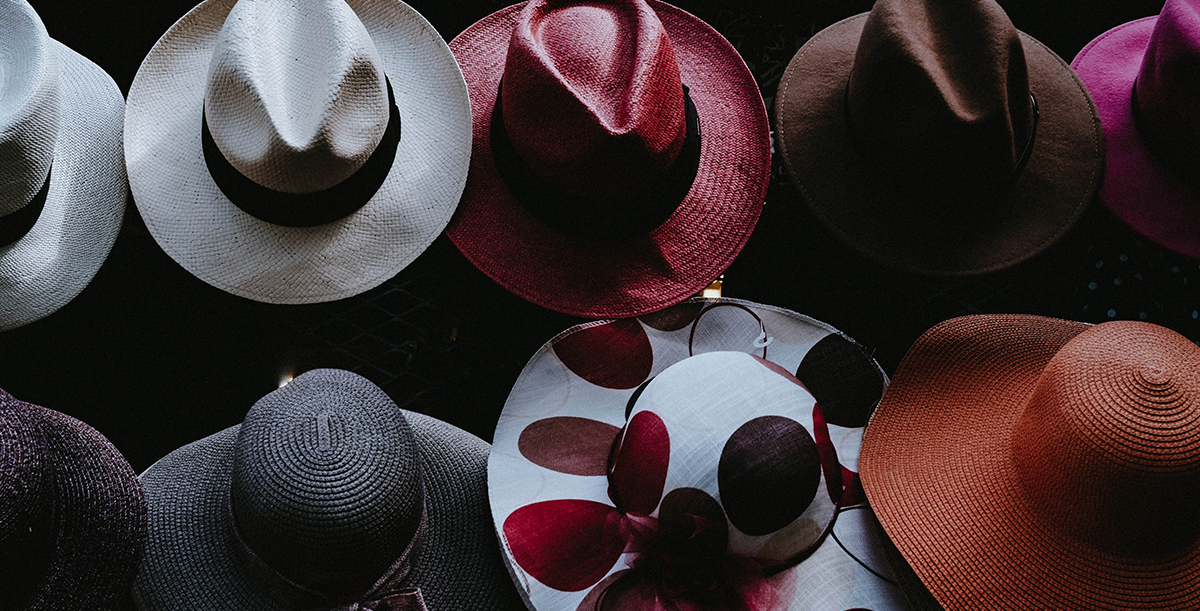The man with three hats

The man loves his three hats. His wife, she doesn’t love them; to her they are just a chore. They lie wherever he leaves them, and she must pick them up, put them back where they belong. Again, and again. Over the decades, she must have picked up those hats hundreds of times. Thousands.
But the man, he loves the hats.
The first is a pork pie hat; short and sweet, he thinks. Small and neat. It sits on his head like punctuation – dark, meaningful on his now white hair. It makes him feel humorous: like every sentence will be a wisecrack; every paragraph will end sardonically. He wears it when going out with the boys (the boys!). When the other old men and he go out for a couple of drinks or just a ramble round the streets. It is a happy hat.
His wife regards it with coolness. She picks it up from the sofa, the chair, the table, with long fingers. It smells of the bars it frequents and the cigarette smoke of the friends. Therefore, it lives on a hook in a cupboard under the stairs.
The second hat is not a hat at all. It is a baseball cap. On purchase, it blazed, fiery red with lightning white writing, loudly declaring allegiance to a baseball team. Sturdily made, with firm jutting rim, initially it sat uncomfortably on the man’s head. But over the years, the cap mellowed; now it rests companionably against his skin. The colour has faded from ‘In your face Sucker!’ crimson to no more than a cheerful ‘Hi, how are you?’ red. The man wears it on summer days, to keep the sunburn from his thinning scalp – pink under sparse white hair is not a good look. The hat makes him feel American, bold, happy-go-lucky, the world is my oyster. He wears it for long walks, day trips away, holidays. Anything more, in fact, than a shopping trip; and even then, if the sun is hot.
His wife, however, regards this hat with irritation. To her, it is a non-essential item. She picks it up with exasperated hands from the hall carpet, the newel post, the kitchen surface. Tosses it into a box in the utility room along with sun creams and sunglasses.
The man loves his hats. He loves them all, but the third hat he regards with gravity. It is the black hat. Whenever he picks it up, he feels it has been waiting for him. No hurry, not impatient. Just waiting. Knowing he would come back for it. It was inevitable. Yet when he bought it, the act was impromptu, spur of the moment. Going past the shop, head bowed, a storm hammering down, just glancing sideways and seeing the hat sitting in the window, the colour of ashes darkened by rain. He knew immediately it was just right, just the thing.
On his head, the hat looks regal. He feels serious, ceremonial. He feels like the weight of the world fell on his shoulders and he survived to tell of tragedy, to pass fearful news on to other survivors.
His wife hates this hat. Respects, but hates it. She never touches it; gets the man always to replace this hat in its own box in the wardrobe in the spare room. She understands what it signifies to him so never tells him. He knows anyway, always tries to remember to put the hat away.
It is his funeral hat. He wore it first to their son’s funeral. The hat’s firm grip round his skull a constant reminder to focus, to concentrate on the detail. Within the hard circle of its circumference he still existed, within that rim he gathered his shattered world. In this way, he managed the service and the lowering of the box into the wet ground, while the sky wept and his wife’s face drowned under tears, her long hair turned into rat tails.
He has added to that memory an accelerating accumulation of other funerals: a brother, friends, former work colleagues. With his hat on, sometimes, he feels more like a statue, carved in sorrow to represent mourning, placed to respect the grieving. His hat holds him together. And it reminds him of his other hats, so it holds him in place.
The man wishes his wife would get a hat. He wants her to go out again, to the shops or the seaside, or just coffee with friends. He has brought her hats to encourage her, straw hats, sun hats, cloth caps in bright colours, but they lie in piles at the bottom of her wardrobe, unused. She will only leave the house now for funerals, her hair cut short, her head bared. Her face is haunted by ghost of their son’s face on that last day, eyes closed, cheekbones pressed white against the skin.
For more short stories, subscribe to our weekly newsletter.














